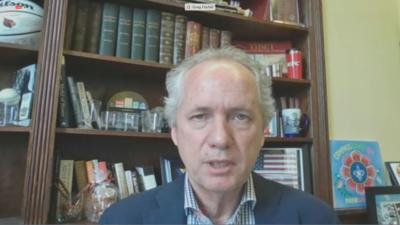LOUISVILLE, Ky. (WDRB) -- Louisville Mayor Greg Fischer on Friday at least temporarily suspended no-knock warrants that allow police officers to burst into a home, day or night, without giving notice.
The move came the morning after a massive protests downtown about the March 13 Metro police shooting of Breonna Taylor, an emergency room tech and former EMT killed during an early morning raid after police obtained a no-knock warrant.
"While we recently changed our policy for no-knock warrants, the use of no-knock warrants will be suspended until further notice," Fischer said during a briefing. "These changes and more to come -- we're not done -- should signal that I hear the community and we will continue to make improvements anywhere that we can."
The mayor added that Taylor's "name and her story will now be part of our city's history."
Fischer had already changed the rules on no-knock warrants earlier this month, ordering that Louisville Metro Police Chief Steve Conrad or a designee must sign off on the warrants before they head to a judge for final approval.
Officers Myles Cosgrove, Brett Hankison and John Mattingly, wearing plain clothes and no body cameras (as per department policy at the time) burst into Taylor's apartment on Springfield Drive to serve a search warrant at about 12:30 in the morning.
In asking a judge to approve a "no-knock" warrant to search Taylor's apartment, officers claimed suspected drug dealer Jamarcus Glover was using the residence to receive packages and keep narcotics or proceeds from drug sales.
Taylor's boyfriend, Kenneth Walker, thought he and Taylor were being robbed, according to his attorney, and fired at officers when they rushed in, hitting one in the leg. A charge of attempted murder was dismissed last week.
Taylor, 26, was shot eight times and died at the scene. No drugs or illegal materials were found at the home.
While police have said they knocked on Taylor's door and announced themselves - despite having a no-knock warrant - Walker has said he didn't know it was police coming into the home when he fired a shot.
Some neighbors have said they didn't hear police knock or announce themselves before shots were fired.
Situations like that one, Fischer said May 18, carry risk to police and the public and need to be "properly vetted."
The mayor didn't say Friday why he was suspending the policy, though he talked about how it is one of several changes being made in the wake of Taylor's death.
Metro Council members recently proposed an ordinance that would severely limit "no-knock" search warrants.
While the newly-proposed ordinance wouldn't ban "no-knock" search warrants outright, it would limit them to the most extreme circumstances.
Officers would have to fill out a "Warrant Application Form" detailing why the "no-knock" warrant is necessary. The form would require the officer's signature and written approval from the SWAT Team commander or his or her supervisor and the chief of police.
Also, the proposed ordinance would bar "no-knock" warrants from being used when the only crime alleged is drug possession, and trained SWAT officers would conduct the search warrants.
Council members and attorneys for Taylor's family have also questioned whether an early morning no-knock warrant was necessary for Taylor, who was not the main target of the investigation.
Photos from the scene released to WDRB News by the legal team for Taylor's family show bullet holes scattered throughout the apartment, from the bathroom wall to a set of curtains in the living room, other windows into the residence and sauce pans in the kitchen. Some pierced the walls of a neighboring apartment, as well.
Nothing illegal was found in Taylor's apartment, and the main target had been taken into custody at his home several miles away before the raid on Taylor's apartment began, according to a lawsuit filed on behalf of Taylor.
This story may be updated.
Copyright 2020 WDRB Media. All Rights Reserved.





















